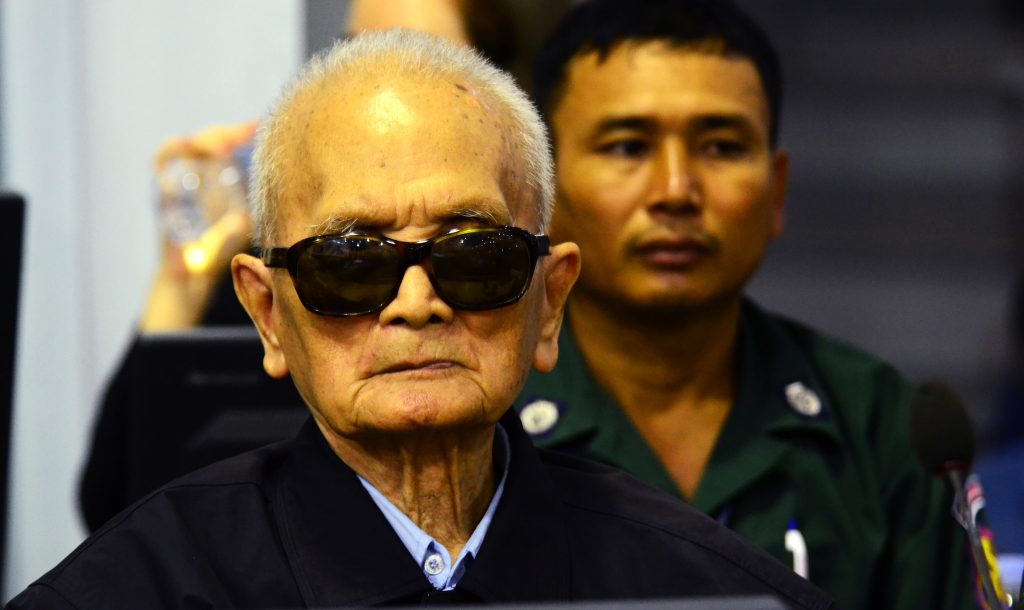Justice for the Khmer Rouge regime’s mass atrocities is coming slowly but surely in Cambodia, Julia Mayer writes.
Last Wednesday, the Supreme Court Chamber of the Extraordinary Chambers in the Courts of Cambodia upheld life-imprisonment sentences for the two surviving former-Khmer Rouge senior officials. Noun Chea, aged 90, the former Deputy Secretary of the Communist Party of Kampuchea, and Khieu Samphan, 85, the former Head of State of Democratic Kampuchea.
In the court gallery in Phnom Penh, Chea and Samphan were appealing their convictions resulting from the 7 August 2014 Trial Chamber verdict in what became Case 002/01. Both had maintained their innocence, denying responsibility for acts which saw a quarter of the country’s population perish as a result of execution, torture, starvation, and disease between 1975 and 1979.
Indicted in 2010, along with Ieng Sary (who died in 2013) and wife Ieng Thirith who was eventually declared unfit to stand trial (and died in 2015), Chea has maintained that he never ordered any killings. He has largely blamed the Vietnamese, and to a lesser extent, factionalism and rogue elements among lower-ranking Khmer Rouge officials and cadre for an estimated 100,000 to 500,000 deaths. Samphan eventually admitted to knowing a little about the mass killings but denied all allegations that he had been in a position of power to order them, arguing he was an intellectual, an ideologist and a patriot, according to a 2014 Guardian report.
Proceedings for Case 002 began in 2011, but the Trial Chamber made moves to separate the charges into a series of smaller trials, narrowing the scope. Referred to as Case 002/01, it included the April 1975 evacuation of over two million Phnom Penh residents to the countryside as part of a totalitarian social experiment and a second phase of mass movement in September of the same year. Focusing specifically on the events surrounding the Khmer Rouge’s rise to power in 1975, the Trial Chamber granted the Co-Prosecutors’ request to include the notorious execution of Lon Nol’s Khmer Republic soldiers at Tuol Po Chrey, in the western Pursat Province.
Three months after the August 2014 Trial Chamber’s verdict, Nuon Chea’s team entered 223 grounds of appeal, with Khieu Samphan’s team entering a total of 148 grounds. These appeals sought a reversal of charges and to have both men acquitted in the Supreme Court.
Chea’s grounds for appeal were largely centred around claims of the Trial Court being biased and ‘incapable of impartially assessing the evidence’. In addition, they cited the court’s failure to bring vital witnesses, ranging from the abdicated King Norodom Sihanouk (who died in 2012), Henry Kissinger and, in particular, ex-Khmer Rouge official and de-facto leader of the Vietnamese-backed People’s Republic of Kampuchea (1979-1981), Heng Samrin. Samphan’s appeal focused on being unaware of the Khmer Rouge’s crimes, claiming he had no part in the decision-making that took place in the regime’s inner circle.
Wednesday’s decision to uphold the life-imprisonment sentences for Chea and Samphan also saw three key reversals of convictions. These were first that it could not be established there was a direct intent to kill during the evacuation of Phnom Penh. Second, that the September mass movement of people could not be proven to be a persecution or discrimination matter. And third, that despite confirmation 250 of Lon Nol’s soldiers and officials were killed by the end of April 1975, there was no evidence to suggest that there was a policy or a directive to kill all of Lon Nol’s soldiers.
News of the life-imprisonment sentences being upheld was met with mixed reactions – intense relief that justice had finally been served, but disappointment that it had taken six years to convict the first and only remaining former senior Khmer Rouge officials. In a two-part series, written in July this year, Khmer Rouge expert Craig Etcheson agreed that the Khmer Rouge Tribunal took too long. The defence lawyers for the accused had clogged the three-tiered court system with numerous litigation claims, mostly centring around the conduct of the court, as they were rightly expected to do in a unique hybrid court of civil and common law. But more critically, Etcheson argues that evidence of crimes committed 40 years ago ends up getting lost, making it all the more difficult to prove the course of events and thus the responsibility for the crimes against humanity. The fact that many of the accused have died before justice could be obtained also points to the trial taking too long. But in his final analysis, Etcheson argues that it has not taken too long in the sense that in comparison with other trials, such as the those concerning the former-Yugoslavia, Rwanda and even Germany seventy years later, justice is the fight against impunity no matter how long it takes.
With a decision having been handed down on Case 002/001, the Khmer Rouge Trial now turns to the presentation of evidence for Case 002/02. Chea and Samphan will face allegations relating to the genocide of Cham Muslims, events at three work sites and four security centres, with a particular emphasis on the Phnom Kraol Security Centre, forced marriages and rape. A trial judgement is expected in December 2017, with expectations high that a further serve of justice will be forthcoming.
Julia Mayer is a Masters of Museum and Heritage Studies student at the Australian National University. She has lived in Malaysia, Indonesia, Vietnam and South Korea, and has written extensively on traditional arts, performances and cinema in the region. She is also the Asia Correspondent for Metro Magazine Australia.
 Facebook
Facebook  Twitter
Twitter  Soundcloud
Soundcloud  Youtube
Youtube  Rss
Rss 